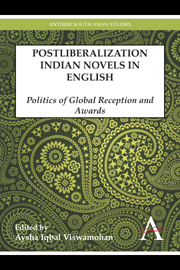Book contents
- Frontmatter
- Dedication
- Contents
- Acknowledgements
- Foreword
- Introduction
- 1 A Maverick Scholar: The Writings of Pankaj Mishra
- 2 Commodification of Post-Rushdie Indian Novels in English: Kunal Basu and the Politics of Decanonization
- 3 Marketing Lad Lit, Creating Bestsellers: The Importance of Being Chetan Bhagat
- 4 Vikas Swarup: Writing India in Global Time
- 5 The God of Small Things: Arundhati Roy's ‘Made in India’ Bookerboiler
- 6 Aravind Adiga: The White Elephant? Postliberalization, the Politics of Reception and the Globalization of Literary Prizes
- 7 ‘The Multinational's Song’: The Global Reception of M. G. Vassanji
- 8 ‘Shreds of Indianness’: Identity and Representation in Manju Kapur's The Immigrant
- 9 Inside ‘The Temple of Modern Desire’: Recollecting and Relocating Bombay
- 10 Tabish Khair: Marketing Compulsions and Artistic Integrity
- 11 Rohinton Mistry and the Canlit Imperative
- 12 Amitav Ghosh: The Indian Architect of a Postnational Utopia
- 13 Here, There and Everywhere: Vikram Seth's Multiple Literary Constituencies
- 14 Whatever Happened to Kaavya Viswanathan?
- 15 Of Win and Loss: Kiran Desai's Global Storytelling
- 16 Immigrant Desires: Narratives of the Indian Diaspora by Chitra Banerjee Divakaruni
- Glossary of Indian Words
- List of Contributors
- Bibliography
- Index
11 - Rohinton Mistry and the Canlit Imperative
Published online by Cambridge University Press: 05 July 2013
- Frontmatter
- Dedication
- Contents
- Acknowledgements
- Foreword
- Introduction
- 1 A Maverick Scholar: The Writings of Pankaj Mishra
- 2 Commodification of Post-Rushdie Indian Novels in English: Kunal Basu and the Politics of Decanonization
- 3 Marketing Lad Lit, Creating Bestsellers: The Importance of Being Chetan Bhagat
- 4 Vikas Swarup: Writing India in Global Time
- 5 The God of Small Things: Arundhati Roy's ‘Made in India’ Bookerboiler
- 6 Aravind Adiga: The White Elephant? Postliberalization, the Politics of Reception and the Globalization of Literary Prizes
- 7 ‘The Multinational's Song’: The Global Reception of M. G. Vassanji
- 8 ‘Shreds of Indianness’: Identity and Representation in Manju Kapur's The Immigrant
- 9 Inside ‘The Temple of Modern Desire’: Recollecting and Relocating Bombay
- 10 Tabish Khair: Marketing Compulsions and Artistic Integrity
- 11 Rohinton Mistry and the Canlit Imperative
- 12 Amitav Ghosh: The Indian Architect of a Postnational Utopia
- 13 Here, There and Everywhere: Vikram Seth's Multiple Literary Constituencies
- 14 Whatever Happened to Kaavya Viswanathan?
- 15 Of Win and Loss: Kiran Desai's Global Storytelling
- 16 Immigrant Desires: Narratives of the Indian Diaspora by Chitra Banerjee Divakaruni
- Glossary of Indian Words
- List of Contributors
- Bibliography
- Index
Summary
‘When you shall these unlucky deeds relate, speak of me as I am; nothing extenuate, nor set down aught in malice: tell them that in Toronto once there lived a Parsi boy as best he could. Set you down this; and say, besides, that for some it was good and for some it was bad, but for me life in the land of milk and honey was just a pain in the posterior.’
Rohinton Mistry, ‘Squatter’The work of Indo-Canadian novelist Rohinton Mistry focuses on the personal struggles of individuals within society, largely within the Parsi community in which Mistry grew up in midcentury Bombay. His writing has been compared more frequently to Dickens, Balzac, Tolstoy and other nineteenth-century European realists than to the more contemporary, postmodern idiom of South Asian writers like Salman Rushdie and Vikram Chandra. Mistry's transparent style, combined with great psychological insight into character, supports his popularity throughout the English-speaking world and his numerous international awards. However, the critical reception of his work in India and North America reflects complex aesthetic, political and theoretical debates among his serious readers. Particularly in Canada, scholarly work on Mistry's fiction is the site of an ongoing discussion about postcolonial issues and Canadian identity politics, as well as trends in literary criticism and the government funding policies that support it.
- Type
- Chapter
- Information
- Postliberalization Indian Novels in EnglishPolitics of Global Reception and Awards, pp. 113 - 126Publisher: Anthem PressPrint publication year: 2013



